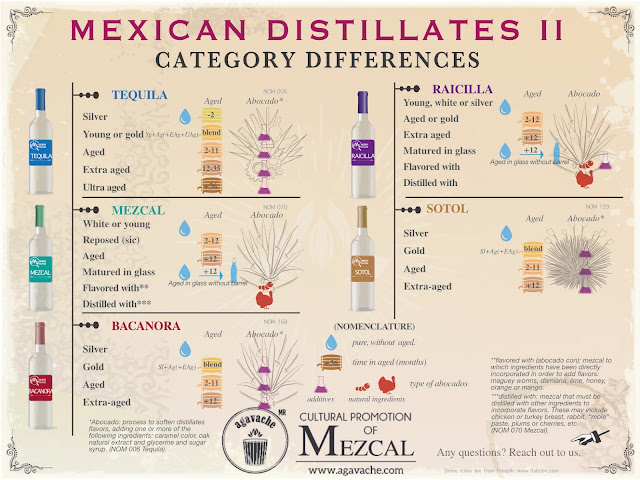Bacanora, Raicilla and Sotol are more similar to Tequila than Mezcal (if we are talking about their categories).
These five Mexican spirits are very similar to the eye, in their flavours, and even in their sales and marketing strategies. So it is no surprise that they are often mixed up or that some shops and restaurants put them under the same general category. In this post you will find out their differences and their respective types and classifications; information that we hope will come in handy for your next shopping trip.
At Agavache we have an extensive collection of diverse agave distillates from Mexico and we promote a responsible and educated consumption. This is why we are constantly researching, educating and sharing information that is useful for the producers, retailers and consumers of Mezcal and other spirits.
Tequila, Mezcal, Bacanora, and Raicilla, are all spirits distilled from the agave but are different from each other because of the types of agave they use, their process and the places they are produced in. Sotol, on the other hand, is a spirit distilled from a plant that -looks- like agave but is a completely different botanical species called the Dasylirion. You can see a more detailed description fo their differences in the following infographic:
Raicilla remains a collective brand, so far without the "protection" that a Denomination of Origin provides, however, at the end of 2018 the Consejo Mexicano Promotor de la Raicilla (Mexican Council to Promote Raicilla) announced that they the Raicilla D.O. will be officially published in 2019. In the article: “Preveen DO de la Raicilla en el 2019” published in the reforma newspaper, they online that Raicilla's D.O. would protect 16 municipalities in Jalisco and one in the state of Nayarit. (1)
Although there is no current law regulating Raicilla, we researched its "popular" classifications and found them to be very similar to Tequila's, Bacanora and Sotol. It's only Mezcal's classification that is different and which is a better representation of the artisanal processes that define the spirit and its culture. This, however, is a somewhat recent change as before the update to Mezcal's NOM in 2016, the regulations and classifications where almost the same as Tequila's since its creation in 1994.
Reading through the laws that regulate each distillate (NOMs), it would seem as if all they did was "copy&paste" de NOM 006 of Tequila, perhaps because it was tried and tested or because it as already accepted in the mind o the consumer. It is commendable that Mezcal's NOM was modified to better reflect the methods and flavours of Mezcal; but it still lacks many provisions to preserve and defend the authenticity of the drink. We hope that someday those errors will be fixed, just as we hope that Raicilla's NOM chooses differentiation and identity over standardisation, preserving it's "spontaneity" described by José M. Muriá in his text “Aproximación a la Raicilla”.
(1) On June 2019, Raicilla obtained its Denomination of Origin and the images were updated. For more information about it, please click: “What you should know about the new Denomination of Origin Raicilla”
At Agavache we have an extensive collection of diverse agave distillates from Mexico and we promote a responsible and educated consumption. This is why we are constantly researching, educating and sharing information that is useful for the producers, retailers and consumers of Mezcal and other spirits.
Tequila, Mezcal, Bacanora, and Raicilla, are all spirits distilled from the agave but are different from each other because of the types of agave they use, their process and the places they are produced in. Sotol, on the other hand, is a spirit distilled from a plant that -looks- like agave but is a completely different botanical species called the Dasylirion. You can see a more detailed description fo their differences in the following infographic:
 |
| Image updated in December 2019 |
Although there is no current law regulating Raicilla, we researched its "popular" classifications and found them to be very similar to Tequila's, Bacanora and Sotol. It's only Mezcal's classification that is different and which is a better representation of the artisanal processes that define the spirit and its culture. This, however, is a somewhat recent change as before the update to Mezcal's NOM in 2016, the regulations and classifications where almost the same as Tequila's since its creation in 1994.
 |
| Image updated in December 2019 |
(1) On June 2019, Raicilla obtained its Denomination of Origin and the images were updated. For more information about it, please click: “What you should know about the new Denomination of Origin Raicilla”
References:
NOM 006 Tequila: http://www.dof.gob.mx/nota_detalle.php?codigo=5282165&fecha=13/12/2012
NOM 070 Mezcal: https://dof.gob.mx/nota_detalle.php?codigo=5472787&fecha=23/02/2017
NOM 159 Sotol: http://www.dof.gob.mx/nota_detalle.php?codigo=669378&fecha=16/06/2004
NOM 168 Bacanora: http://www.dof.gob.mx/nota_to_doc.php?codnota=4917328
NOM 142 Bebidas alcohólicas. Especificaciones sanitarias: http://www.dof.gob.mx/nota_detalle.php?codigo=5386313&fecha=23/03/2015
Consejo Promotor de la Raicilla:https://cmpr.mx/en/
Mabi Cuishe
instagram: @mabi_cuishe
twitter / facebook / instagram: Agavache
With an industrial design background and mezcal, wine & spirits certifications (WSET level 2), I decided to found Agavache with my partner Alejandro, to promote mezcal from a cultural identity and socially responsible perspective. It’s not just about selling it, it’s about making each sip transcend into a consciousness educated by the magic, traditions and work that goes into making the elixir.



Comments
Post a Comment